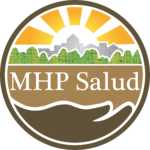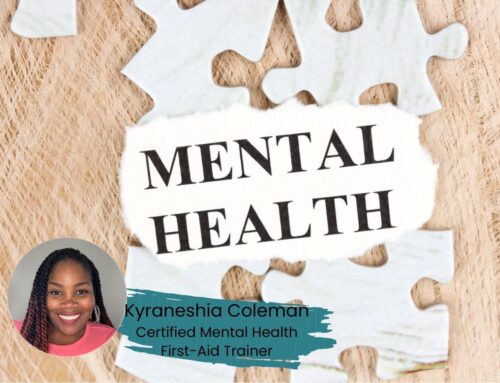Why Community Health Workers are the Solution for Your Organization
Published July 2020 | Back to all news and updates
A Community Health Worker is a trusted member of the community who empowers their peers through education and connections to health and social resources. Although they operate in many different settings, improving health outcomes for vulnerable populations is a common goal shared between both Community Health Worker (CHWs) programs and health care center programs. CHWs are a great addition to health care center teams. They are unique to traditional outreach workers in that their cultural identity allows them to understand their local communities on a deep and fundamental level. Being that they live in the communities they serve, CHWs have a deep understanding of the cultural factors that impact an individual’s health. They use this knowledge to determine best practices when conducting outreach, facilitating educational sessions, providing case management, and assisting people with social service applications.
Successful CHWs also nurture important connections inside their communities, which can be a vital resource for a health center or organization seeking to implement health initiatives directly where individuals live, work, worship, and play. They use this knowledge to fluidly determine the best approaches for conducting daily outreach, facilitating educational sessions, providing case management, and assisting people with social service applications.
For instance, individuals in predominantly Spanish speaking neighborhoods may have trouble understanding information and instructions from their health care provider. This may be for a number of reasons, but common barriers typically include linguistic barriers as well as cultural differences. CHWs can step in to serve as translators, and even follow up with individuals after the fact to ensure the information is truly understood and retained. Additionally, CHWs share their knowledge of cultural views and social stigmas with health care professionals so that those professionals can also adapt their strategies to provide the highest quality of care possible.
Community Health Workers have a long history of improving health outcomes for individuals that live in underserved areas. For example, participants who partook in our recent initiative that supported survivors of Intimate Partner Violence reported lower levels of stress and depression, as well as higher feelings of empowerment and community support. The initiative also illustrated the business-case for CHWs, as the initiative returned of $1.73 per dollar invested.
The Value of Community Health Workers
In addition to the unique insight CHWs can provide on populations, they possess the skill-sets to fill a variety of roles that fall within the scope of practice of many health care organizations. For example, CHWs can help coordinate medical appointments, provide coaching and social support, help individuals navigate health care systems, implement individual and community assessments, and participate in evaluation and research. The ability to do this work is a small part of the value that CHWs can add to any health care center.
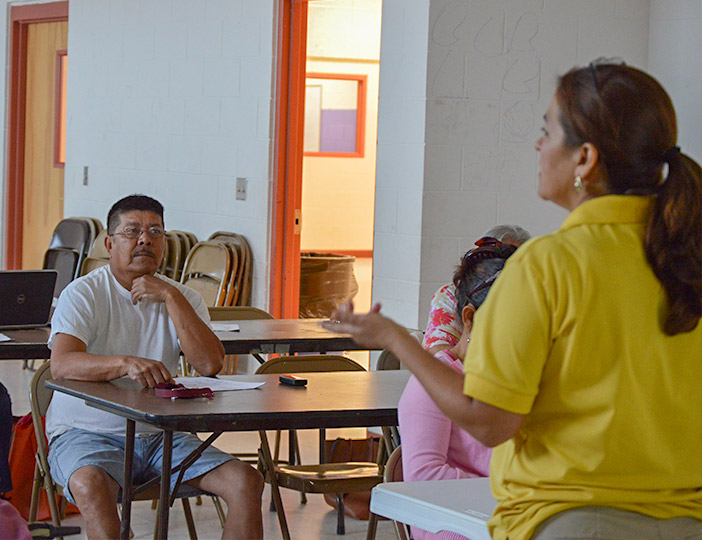
In MHP Salud’s Navigator program, CHWs help answer questions about open enrollment and the health insurance marketplace.
CHWs are Cost Effective
The nature of work CHWs perform can help organizations use their resources more effectively and reduce unnecessary medical services which saves money and time. They help individuals remove barriers to treatment and care and encourage self-management which has been found to be a cost-effective way to prevent and manage chronic conditions such as diabetes, asthma, hypertension, and cardiovascular disease.3
In recent years, the economic benefits of CHW programs have been measured through return on investment (ROI) analysis. (An ROI analysis demonstrates the amount of money saved for every $1 invested.) At MHP Salud, our ROI analysis of our cancer prevention program, Cada Paso del Camino (Every Step of the Way) had an ROI of $3.16 for every $1 spent. Further, positive ROIs have been demonstrated across a variety of different programs that tackle different health issues that disproportionately impact underserved communities. For example, a CHW-led diabetes program in Massachusetts saw an ROI of $1.36 and a CHW program in Connecticut that provides application assistance for Medicare saw an ROI of $4.1
CHW Programs Have Proven Health Outcomes
CHW programs have a track record of improving health outcomes within their communities. Across America, individuals who participated in CHWs programs have reported positive changes for varying health conditions such as adopting healthy eating habits to reduce the risk of diabetes and other chronic heart conditions, reducing the need for asthma-related emergency room visits, and increasing breastfeeding amongst mothers. Our CHW-led birth and breastfeeding support program, Amor Maternal, saw 100% of the participants initiate breastfeeding and over half continued to do so after they left the hospital. A CHW program for pediatric asthma patients in Boston had a 68% decrease in related emergency department visits and an 85% drop in related hospitalizations.3
These positive outcomes are due in part to the trusting relationship between CHWs and community members. Individuals know they can count on a CHW to provide them with accurate information that they can understand and link them to the resources they need. And through CHW-led outreach efforts and education sessions, CHWs also help individuals feel more confident in their ability to do the self-management for their health conditions.
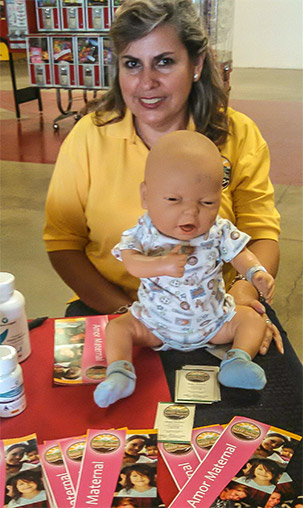
CHWs Programs are Flexible
Another valuable aspect of the work CHWs do is their understanding and ability to be flexible with time and space to meet the needs of their community. For example, CHWs can conduct outreach outside of regular office hours, which could be when your target population is most active. Additionally, the relationships CHWs have with individuals allows them to facilitate educational sessions in non-traditional settings, such as a participant’s home. These measures can help to ensure that your organization is effective at meeting the population where they are at.
CHWs can also adapt and get creative with their strategies when situations arise that could prevent progress towards an individual’s health. CHWs in our programs have easily transitioned into strategies that follow safety and social distancing guidelines from national and global health organizations to stop the spread of the coronavirus. Their close relationships with community members allow them to personally call individuals to inform and update them on services, connect them to resources, and provide all of the information that they would normally discuss during in-person educational sessions. Additionally, CHWs are keeping individuals up to date on safety information and social service programs that have been impacted by the pandemic.
CHWs Help Better Relationships Between Health Care Professionals and Patients
The value of the information that CHWs provide about their community can have a positive impact at every level of your organization. Physicians and clinicians are able to improve communication and develop a better relationship with their patients through a CHWs understanding of the language and the cultural nuances of their population. Additionally, CHWs can improve the effectiveness of medical visits by helping participants prepare documents, monitor and keep records of their progress, and understand what questions they need to ask.
For health care teams, CHWs can interpret and analyze social issues that impact an individual’s health, providing the insight they need to develop effective care plans. Along with planning, CHWs can also perform the work that will help your organization overall, like promoting preventive testing and screening, providing follow-ups, and educating individuals on the appropriate use of the emergency room. These services can help a health care organization reach or improve their performance on quality of care, core clinical, or health outcome measures.
Start or Strengthen Your CHW Program with MHP Salud
The work CHWs can do at your health care organization can improve the way your team works together and ensure that your organization is serving the population as effectively as possible. Further, CHWs programs are flexible by design and can be implemented to address a variety of health issues for different populations. Over the years MHP Salud has developed and successfully implemented CHWs programs to address a variety of health topics. We’ve used this experience and information to develop training and consulting to help organizations start or maintain Community Health Worker Programs. To learn more about our products and support please visit CHW Training and Consulting.
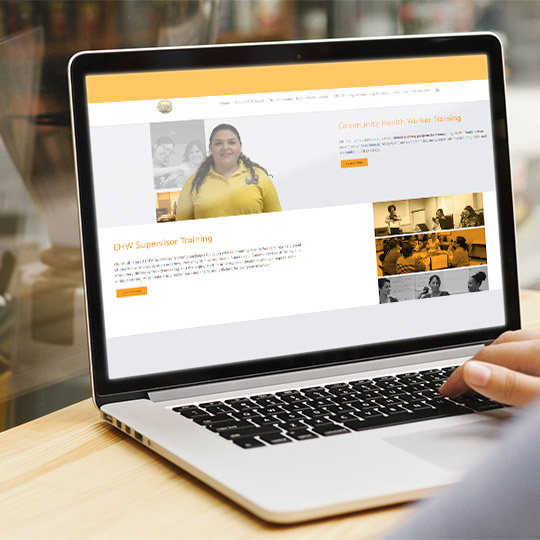
- https://commed.umassmed.edu/sites/default/files/publications/UMass%20MACHWA%20Demonstrating%20ROI%20presentation%205-11-17_final.pptx_.pdf
- Community Health Worker Core Consensus Project (2016). Understanding scope and competencies: A contemporary look at the United States community health worker field. Available at http://files.ctctcdn.com/a907c850501/1c1289f0-88cc-49c3-a238-66def942c147.pdf 3 Institute for Clinical and Economic Review. Community Health Workers: A Review of Program Evolution, Evidence of Effectiveness and Value, and Status of Workforce Development in New England. The New England Comparative Effectiveness Advisory Council. Boston, Massachusetts: July, 2013
- https://www.mass.gov/doc/achieving-the-triple-aim-success-with-community-health-workers-0/download
About MHP Salud
MHP Salud has over thirty years of experience implementing CHW programs and training organizations looking to start and/or strengthen their own CHW programs. For more information about MHP Salud, our services, and how we can help you, please email us at info@mhpsalud.org

